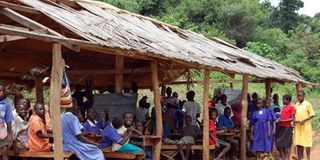Early childhood development is a good head-start for Ugandan child

What you need to know:
Taking action is the only sure way of demonstrating our commitment towards protecting, empowering and guaranteeing equal opportunity for all children aged 3-5 years in Uganda. It is time for action; together we can.
In this third week since the opening of school’s second term, the world is commemorating the Day of African Child. While this year’s event is on the theme: ‘2030 Agenda for Sustainable Development for Children in Africa: Accelerating protection, empowerment and equal opportunity: a recent study by Twaweza East Africa through Uwezo initiative, shows that only 27 per cent of children in Uganda aged between 3-5 years are attending pre-primary education, translating into a four percentage point improvement from 23 per cent in 2011 (Uwezo, 2016). This finding suggests, potentially that about 42 per cent of children will be able to attend by 2030.
These disturbing statistics are in part explained by the huge location and socioeconomic status-based disparities with more than a half (53 per cent) of the 3-5-year-olds found to be attending in urban areas in 2011 compared to only 20 per cent of the rural-based children (Uganda Bureau of Statistics, 2012). With only 7 per cent of children from the lowest wealth quintile attending, and considering that the majority of the ECD centres in Uganda are privately owned and, therefore, not fee-free, the most prominent constraint hindering universal enrolment in pre-primary schools (ECDE) remains the associated costs of attendance . As such Ugandan children continue to miss out on opportunities explained in Gladwell (2011) bestselling thesis understanding success where he highlights opportunities (or the lack thereof) that accrue from early life and persist for years, thereby locking children into overall life achievement or underachievement.
A research carried out by Unicef notes that ECDE plays a big role in preparing the children for the intellectual requirements needed at Primary Education. Among the benefits, is the reduced dropout rates, and improved mastery of foundational literacy and numeracy skills critical for life-long learning and currently a challenge that actors in the education sector are trying to deal with.
Therefore, as we commemorate the Day of African Child, it is important to recognise that guaranteeing access to ECDE for all children aged 3-5 is one of the most strategic policy decisions towards improving learning and associated outcomes. The conversations around establishing a one-year reception centre at each UPE school need to move from paper to action. Aware of the financial constraints at hand, the starting point could be piloting in the least served and worst performing districts until finally the entire country is covered, like the old adage one by one makes a bundle. Taking action is the only sure way of demonstrating our commitment towards protecting, empowering and guaranteeing equal opportunity for all children aged 3-5 years in Uganda. It is time for action; together we can.
Violet Alinda and Judith N Tumusiime,
[email protected],
and jtumusiime2twawezaorg




